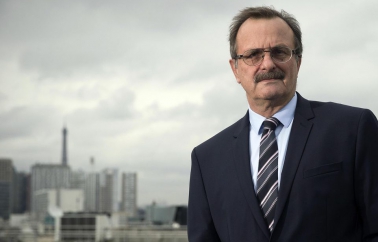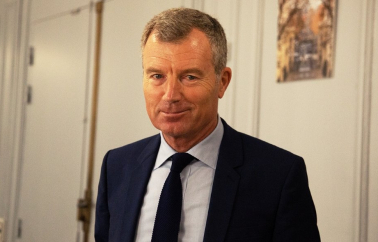
The Prefect State Entrepreneur- Speech by M. Jean-François CARENCO- Honorary Regional Prefect of Ile-de-France, Honorary President of ACP at October 16th 2017
Paris, October 16th 2017.
Prefect, State entrepreneur
By receiving them at the Elysée not so long ago, the President of the Republic asked the prefects to be state entrepreneurs. In my opinion, I subscribe to this idea, by adding “the tireless manufacturers of the Republic.”
But who are the Prefects created by Napoléon, First Consul at the beginning of the 19th Century? During that creation, Lucien BONAPARTE, First Consul’s brother stated that “that day is the day of the populations” (sic). We would like to say, we hope so, populations under the French administration. To understand that, let us remind that in France, the State built the Nation contrary to the other European countries. Let us remember also, that the Prefects, as the successors of the intendants during the former Regime found an institutional legitimacy that their seeming predecessors had not.
Since then, the Prefects have lived the regimes and even if their uniforms remind too well their inspiration (the uniforms) by Vichy’s regime, they are inseparably linked to the Republic.
But who are they?
They are high civil servants, in general from the National Administration School, who made their career in the Prefectural Corps, and nominated by the President of the Republic’s decree in the Council of Ministers. They could be dismissed immediately (we have just seen it recently). In reality, the Prefect is a grade and a function at the same time. About 250 persons have the grade of Prefect, who, in general is acquired in a first territorial position (Department Prefect, Region Prefect, Police Prefect, or Delegate Prefect). The others serve to other functions of the administration (Ministerial cabinet, ministries, Council of State, Court of Auditors, public companies…) The others held some functions at the Ministry of Interior, who manage the corps. Finally, some others (a small number) are awaiting new assignments.
These are the facts.
What is his/her role?
Here, we will limit the analysis of “ordinary” Prefects, Department Prefects or Regional Prefects who are in office in regions or departments.
They have a dual role: representing the State, being the representative of the government and of each member of their district.
Representing the State
In the absence of the Minister, the Prefects represent the state in his/her territory. For this reason, he/she takes precedence on all other members of the constitute corps and a decree of 1989 reminds precisely, the protocol order in territories: he/she is the first.
It is for this purpose that he/she talks last in ceremonies, chairs the republican ceremonies included the militarian ceremonies, that he/she is welcomed in every municipalities, and territorial assemblies, that he/she receives the foreign personalities.
Obviously, that State representation cannot be exempted of courtesy and empathy.
His/her presence in cultural, sporting, social events, as well as the invitations he/she send, would like to be the proof of the State encouragements to the actors of civil society.
Representing the government and each Ministers
The Prefect is the chief of all the civil administrations of the State and he represents each Minister, included the Army Minister and the Minister of Justice.
Obviously, the history, the principle of separation of powers, laws and the practice have rebalanced it. The Prefect does not lead the army, the fiscal services, the pedagogy of the National Education, universities, justice etc… Of course, the territorial collectivities, if they are controlled by the Prefects, are freely administered since 1981.
But then, the Prefect’s powers who obey to each Ministers, are heavy and significative: public order, company’s policy, social and cultural policy, housing policy, environment policy, urban policy, immigration etc…
All of this, and much more, are coordinated and impelled by him/her who is the responsible of all the State services in the territories. Even if it is more complex in reality, it is rather the way it goes, and this is the guarantee of the application of public policies, in their complexity.
Evidently, as it must be the rule in democratic regime, the Prefects’ acts are submitted to the judge’s control.
State entrepreneur
Beyond that static description of the Prefect’s role, I prefer retaining a dynamic definition writing that the Prefects are “the State entrepreneurs, the promotors of the Republic”.
Let us remind that is it under the title of Republic guardian they exercise the legality audit, and the application of law in their territory. It involves the view of local authorities’ acts by the implementation of the article 40 of the penal procedure code, by the duty of seisin of highest authorities in case of anomalies associated with the State services. Far from having a “bogeyman” role, it looks an essential role of national cohesion to me.
Then, the Prefect should be the one who gathers to build the future. In its policy of neutrality, with its actions’ abilities, in its role of State Representative,the Prefect can and must, gather all the actors of an issue to find solutions together, in each subject.
In a world where the governance methods should refuse the fact that “the top can be imposed from the bottom” or the “bottom requires from the top” (if the bottom and the top still have a sense) or the solutions must be defined with all the actors, in full responsibility of everyone, then the Prefect has to act, to stimulate, to coordinate. What he can do for the companies in difficulty is a perfect example. In conjunction with the Ministry of Finances, he listens to the CEOs, builds a solution with the syndicates, requests the bank system, public aids, local authorities. He operates with the commercial court and the judicial officers. In reverse, he operates a similar action for growing companies, in creation or wishing to settle in.
Urban development and housing policy, accommodation must proceed the same practice: gathering, exchanging ideas, imagining, acting together. We are at the core of the Prefect’s role in the 21st Century.
Proponent of the Republic
In doing so, I dare to write it, the Prefect becomes one of the Republic’s hussar. In these times to reinvent at all because of the incredible evolution of the techniques and communication, in these times where, as a result, the temptation of downturn, the rejection of the others, the preference of the past, in these times where, on the contrary, the choice should be done on the building of the future, the radiance against barbarism whereas the Republic is the path.
It is for the Prefects to promote that Republic, which is the guarantee of brotherhood, culture, knowledge, creation of values and liberty. In this role, the Prefects, at the orders of the governement’s policies must constantly take the risk to gather, create and invent.
As a conclusion
All in all, I would like to take up the five ideas I mentioned in the introduction of the 2nd conference ERIGNAC, held in La Sorbonne on September 25th which dealt with the following issue: The State of the Republic”.
1st idea: (text of Regis DEBRAY)
The Republic is the plus democracy, more precious and more precarious, more ungrateful, and more rewarding.
The Republic is the liberty plus the reason, the rule-of-law plus the justice, tolerance plus the volunty. Democracy, will we say, is what the Republic left when we turn out the lights.
2nd idea: In this world who is changing rapidly and where everything has to be reinvented, the Republic also must be redesigned because the information system now questions the representative democracy the basis of our institutions: that is the question of the opinion facing the vote, the desire facing the expertise.
3rd idea: Elected representatives, elites, dare we say it, are called to redefine a general interest which gathers, stronger than the sum of individual interest that populism repaints sometimes to the colors of a misused democracy.
4th idea: the world population’s movements, the abolishment of borders by travel facilities but also our absolute duty of brotherhood, disrupt that republican reconstruction in a world with a measureless topology.
5th idea: To refuse downturn, the subject of the others, the idea that yesterday was, on principle, better than tomorrow, to think that the power of the spirit which is now almost without limit, can reinvent a world of equality, liberty and brotherhood, a world of culture, exchange and development, to make the lights defeat barbarism, there is a collective path which is called the Republic.
… And the Prefects are the defenders and the promoters!



